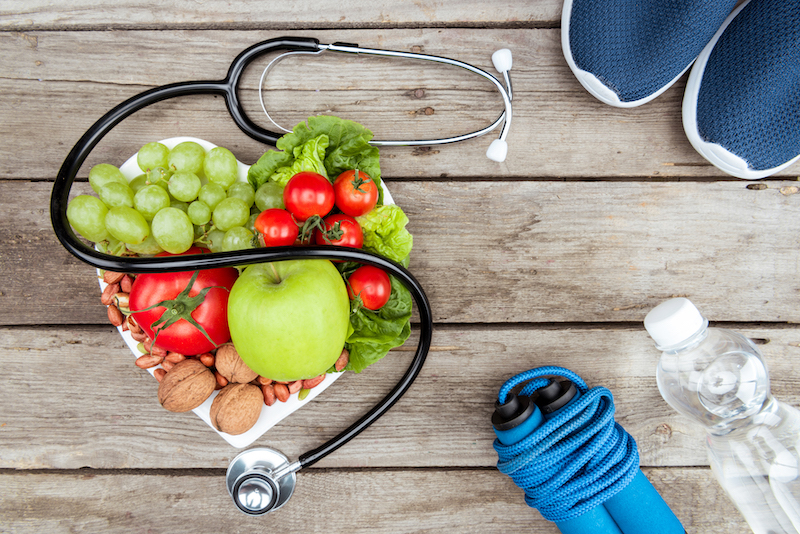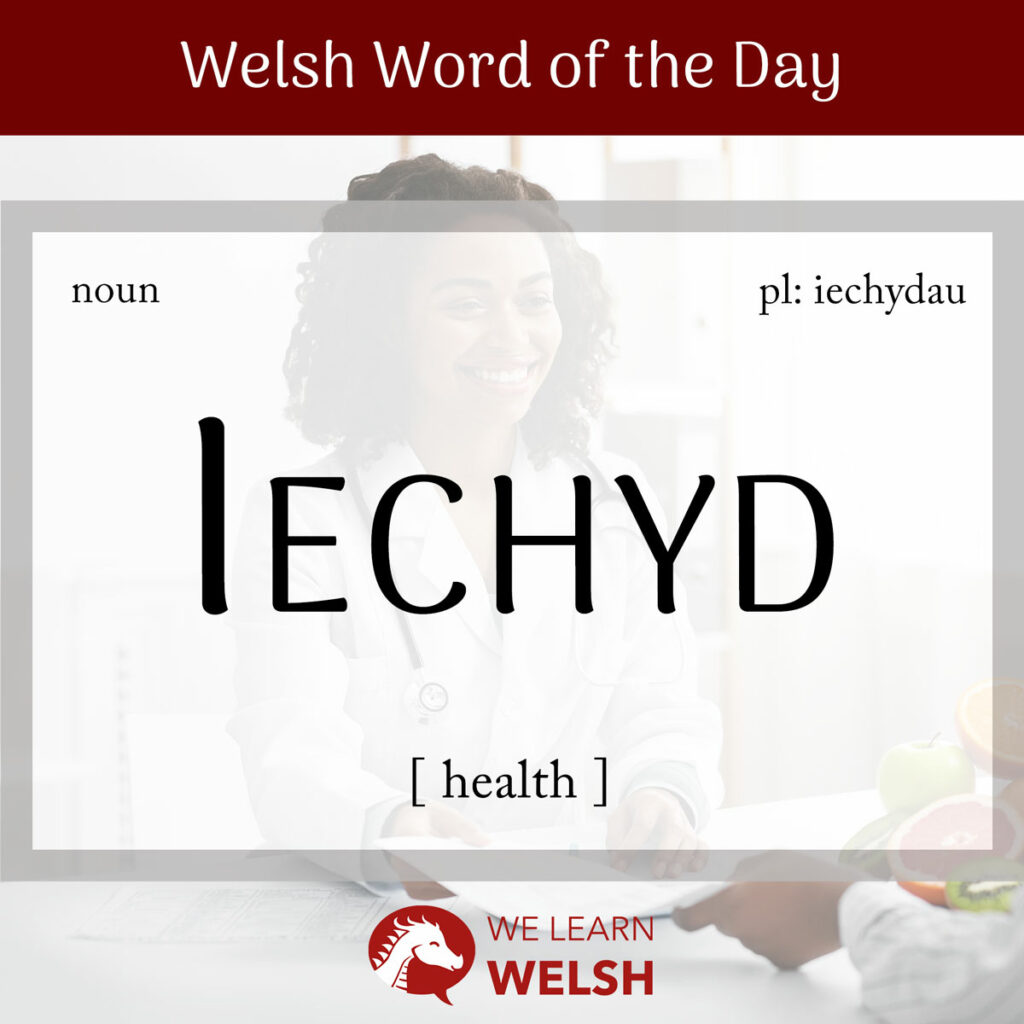One of the very few Welsh phrases that you might find some English speakers are actually aware of is iechyd da, which is the Welsh equivalent of Cheers!
I’ve often heard it rendered as the slightly unglamorous yucky-dah when used in toasts by non-Welsh-speakers, at dinner parties in very Anglicised parts of Wales, or on the borders. This common exclamation literally means good health, and derived from iechyd, which is our Welsh word of the day today.
iechyd
health
Iechyd, of course, means health. It’s a masculine noun, and like its English equivalent it’s usually uncountable, but the plural form if you did ever need to use it is iechydau.
It’s derived from the adjective iach, which means healthy, combined with the suffix –yd, which is used in Welsh to form abstract nouns. Another example of this formation is mebyd (childhood / infancy), which comes from the word mab (son). The etymology of iach itself is unclear, but it has cognates in the other Celtic languages, like the Cornish yagh.
Although iach is always the word for healthy when you are referring to a person, animal or plant that is in good health, if you want to describe something that is good for the health, you can also use iachus or even iachusol.
All three options are fine here, but I’d say iachus is the most natural sounding choice. You might want to describe bwyd iachus (healthy food) or hinsawdd iachus (a healthy climate). Just make sure you never call a person iachus because you’ll get some very odd looks!
Some of the most important phrases to learn including iechyd include:
- mewn iechyd da / yn dda eich iechyd = in good health
- yn wael eich iechyd = in bad health
- mewn llawn iechyd / yn berffaith iach = in perfect health
- adfer iechyd = to restore to health
- adennill iechyd = to regain health

You can also use Iechyd! as an exclamation to display shock or surprise.
You might want to make a note of the word iachau, which is a verb that basically means to make healthy or to heal. So, a meddyg (doctor) must try to iachau their clef (patient). If someone is recovering or healing up, you would normally just use gwella (to get better). However, if you do want use iachau, you’ll have to add the reflexive prefix ym- to make ymiachau, since it’s something they are doing to themselves.
Iechyd doesn’t undergo any mutations, because it begins with a vowel. However, it is susceptible to h-prosthesis, which is a phenomenon in Welsh where a h sound is added to the beginning of a word in certain specific situations. H-prosthesis occurs following eu (their), ein (our), and ei (his / her, but it only causes h-prosthesis when used to mean her).
Mae hi’n dal i boeni ynghylch ei hiechyd hi.
She’s still worrying about her health.
In order to look after our iechyd, we should try to bwyta’n iachus (eat healthily), cysgu (sleep) for seven to nine hours a night, and get plenty of ymarfer corff (exercise). It’s also a good idea to have regular check-ups with a meddyg (doctor), and to take good care of our iechyd meddwl (mental health).
Everyone has their own tricks and tactics to keep mewn iechyd da, and some people swear by specific bwydydd iechyd (health foods), by taking fitaminau (vitamins), or visiting sbas (spas) and cyrchfannau iechyd (health resorts). We all find different things to be iachusol / llesol (health-giving) and what’s for sure is that you have to find what works for you.
Our iechyd is definitely one of the most important things we have in life – as the Welsh will tell you, y cyfan sydd ei angen i fod yn hapus yw iechyd da a chof gwael (all you need to be happy is good health and a poor memory).
Slightly pessimistically, the Welsh have plenty of antonyms for iechyd! You can use afiechyd (poor health), anhwylder (sickness / indisposition), salwch (a specific sickness), gwaeledd (the general state of being unhealthy, poor or wretched) or clefyd (illness / disease). Taking wedding vows in Wales, you’re likely to use the phrase yn glaf ac yn iach (in sickness and in health).
You might have noticed the similarity between afiechyd and iechyd. This is because afiechyd, like our word of the day, is formed by adding the –yd suffix to an adjective. In this case, it’s afiach, which is the direct antonym of iach. Afiach means unhealthy, but can also describe something unhygienic, and is even used when exclaiming that something is disgusting.
Dysgodd yr athro Addysg Iechyd.
The teacher taught Health Education.
Since Cymru (Wales) began to undergo a process of datganoli (devolution) from central UK political control, one of the matters the Senedd (Welsh Assembly) has had more control over has been iechyd cyhoeddus (public health). This means there are some differences between health services in Wales and in England – for example, in Wales, meddyginiaeth (medication) that is recommended by rhagnodyn (prescription) is free of charge.
However, there are negative elements too. Because Wales is a very rural country, some parts of North Wales and mid-Wales are too underpopulated for the Gwasanaeth Iechyd Gwladol (National Health Service) or GIG to support the funding of specialist medical units. This means that cleifion (patients) often have to travel a long way to access the triniaeth (treatment) that they need.
Currently, Wales’ Prif Weinidog (First Minister) is Eluned Morgan, a gwleidydd (politician) in the Labour party who previously served as Ysgrifennydd y Cabinet dros Iechyd a Gofal Cymdeithasol (Cabinet Secretary for Health and Social Care) during the bulk of the COVID-19 pandemic. There is an interesting bilingual documentary on S4C about her tenure, called Gweinidog Iechyd Mewn Pandemig (A Health Minister in a Pandemic).
Although we complain about it, most British people are very grateful and proud to have access to free gofal iechyd (healthcare). Did you know that the architect of the Gwasanaeth Iechyd Cenedlaethol was a Welshman, Aneurin Bevan? Well, now you do!


